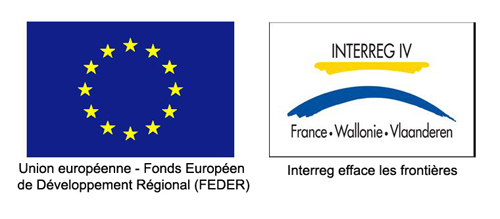Context
The contribution of organic production methods to sustainable development is now confirmed. However, whereas organic production is supported by a steadily growing market, reflecting strong consumer interest, the three regions involved in this project have seen a stabilisation of the conversions since 2005. There is a widening gap between an increasingly international market and the development of organic production and sectors at regional level.This situation presents several challenges justifying cross-border cooperation. To overcome the dispersion of producers operating in similar systems, they need to work together and pool the expertise available in the three participating areas. There are some interesting complementarities between production systems and sectors on the one hand and between the areas of expertise developed by the project partners on the other. Each region has specialities and results that may be of interest to the others.
Among the challenges, two issues need a special attention :
1) New European legislation stipulates 100% organic feed for ruminants. This requirement is intensified by an international context of (1) a shortage of organic cereals, oil plants and protein plants for use as animal feed and (2) an upturn in demand for animal products (milk and meat) in Europe. Solutions will therefore have to be provided in all three regions at once, as importing is not necessarily a sustainable option. Solutions implemented at farm level for the same product will need to be adapted to farm specific features, whereas complementarities between regions should be developed.
2) In vegetable production there is a need for growers to become more professional in order to adapt their production systems more closely to the sectors’ requirements, for both short and long agri-food chains. The cross-border region is big enough to maintain and develop the position of market garden products. However, systems need to be optimised, and a lack of coordination between growers in the three participating areas, who rarely know one another despite supplying their products to the same market, is creating a competition situation which benefits no-one.
Objectives
General aim :Networking of producers and support organisations in the three regions to stimulate and develop expertise, experience and innovation with respect to ruminant feed and organic vegetable production issues. In the longer term, networking serves the aim of sustainably developing exchanges and complementarities between organic sectors in the cross-border area.
Special aims :
- Networking of partners’ established expertise and knowledge.
- Better understanding of the specific features of the organic systems (stock farming and vegetable growing) and the associated sectors in the three regions.
- Identifying the problems and how they arise on the different types of farm within the three participating areas.
- Comparing possible solutions proposed by producers, their supporting criteria and the factors to be considered in their assessment.
- Through exchanges between producers and technical advisors, jointly constructing innovative alternative proposals. Adapting and optimising the selected plan.
- Forming partnerships and supporting producers who are trying out these solutions at farm level. Following up field trials and defining the conditions of their development by producers in the three participating areas.
- Networking, exchanges and dissemination of available data, current experiments and results throughout the project. Networking will be organised at three levels : firstly, the project partners; secondly, the producers involved; and thirdly, all the producers and organic sectors concerned in the three participating areas.
Expected results
With regard to animal feed we aim to define the innovations under development, on dairy farms, in the three participating areas with a view to optimising on-farm production of fodder resources, particularly protein that are not degraded in the rumen. Two approaches are envisaged, on the one hand optimising fodder mixes and on the other, introducing new crops into the rotation. Networking of stock farmers and crop farmers is another expected result.On the vegetable side, the project will improve producers’ knowledge in the three participating areas (who produces what? How, why and for which market?) and knowledge across the marketing channels (long and short, reducing the fears of unfair competition in order to gain a better understanding of the market context). Another aim will be to stimulate dynamics between producers in the three participating areas, with a view to subsequent continuation. Pooling of experiences and experiments designed and carried out in the three participating areas will maximise the likelihood of finding innovative solutions that can be transferred to the whole of the study area.
Expected cross-border impact of the project :
- Increase in the number of organic farmers and the organically farmed land in the cross-border region.
- Establishing of links between operators and improving the performance and image of organic stock farming and vegetable growing systems in the three participating areas.
- Contributing to the sustainability of conventional agriculture in the cross-border region by transferring results and practices from organic farming.
Contribution
CRA-W is mainly involved in activities on the dairy farming systems (Actions 1, 4 and 5).Activity 1 : Networking
- For the Walloon farmers involved in the project, communication of the information so that each individual knows what other farmers in the cross-border region are doing.
- For the technical advisors involved in the project, organising exchanges of views and experiences on the progress of experiments conducted in each participating area and on the way to solve common problems.
- For all the farmers and technical advisors, in the three participating areas, arranging visits to farms and experimental and demonstration sites.
Activity 4 : Identifying organic farmers’ needs and providing cross-border support in finding sustainable solutions
The general approach is to develop and build on solutions already implemented or proposed on farms in the cross-border region. An inventory of production and consumption types and volumes will be drawn up by region and by product, along with a typology of farm structures according to their degree of fodder autonomy.
Activity 5 : Technical support for fodder products and animal feed
Supporting solutions already implemented or proposed on farms in the cross-border region and supplementing them by technical experiments at farm or experimental station level. Each farm will be regarded as a source of experience whose results can be exploited at cross-border level. A trial involving complex forage mixes is in progress at Libramont.
Partners
Flemish partners- PCBT : Interprovinciaal Proefcentrum voor de Biologische Teelt
- PCG : Provinciaal Proefcentrum voor de Groenteteelt Oost-Vlaanderen
French partners
- GABNOR : Groupement des Agriculteurs Biologiques du Nord-Pas de Calais
- Chambre Régionale d’Agriculture Nord Pas de Calais
- PLRN : Pôle Légumes Région Nord
- FREDON : Fédération Régionale de Défense contre les Organismes Nuisibles
Walloon partners
- CEB Centre d’Essais Bio
- CARAH : Centre pour l’agronomie et l’agro-industrie de la province du Hainaut
CRAW off coordinator
Mr Sébastien Labrune et Mme Jessica ZaouiGABNOR
Le Paradis
59133 Phalempin
France
Tel. : +33 (0)3 20 32 25 35
Fax : +33 (0)3 20 32 35 55
E-mail : sebastien.labrune@gabnor.org et jessica.zaoui@gabnor.org
www.gabnor.org
Funding
- CE - Regional politics - INTERREG IV
- CRA-W - Walloon Agricultural Research Centre
- DGARNE



